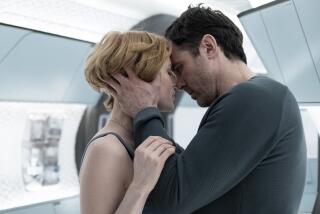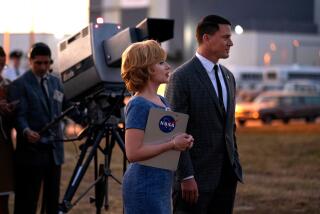‘Challenger’: The Wrong Story Got Filmed
- Share via
No one who watched will ever forget the explosion and fireball that destroyed Challenger and killed its seven crew members on Jan. 28, 1986, just 73 seconds after liftoff at Kennedy Space Center in Florida.
Television pictures of the space shuttle disintegrating and the shocked faces of spectators on the ground merged that day into a single horrifying footnote to the nation’s space program.
Bad judgment? Unheeded warnings? A catastrophe that could have been avoided? There’s a movie here, all right, but not the one ABC delivers at 8 p.m. Sunday on Channels 7, 3, 10 and 42.
The critical internal debate over postponing liftoff or launching on schedule--including doomsday warnings by Roger Boisjoly, an engineer for the manufacturer of the booster rocket that failed Challenger--is indeed a significant part of executive producer George Englund’s script. More than anything, however, “Challenger” is a testimonial to the astronauts who lost their lives that morning, especially Christa McAuliffe, the enthusiastic New Hampshire woman chosen to be NASA’s first “teacher in space.”
In the curious way that death in a good cause is somehow seen as more valorous than serving the same cause in an identical way without dying, Challenger crew members are celebrated here as martyred heroes and heroines, almost as if not surviving was the badge of achievement that elevated them above other astronauts.
“Challenger” itself seems almost to make that point by presenting the astronauts, including McAuliffe (Karen Allen), so circumscriptively (their families refused to cooperate in the making of the movie) that they come across, rightly or wrongly, as essentially flat, uninteresting figures who just happen to be doing highly interesting and challenging work.
The story alternates between home and space fronts. The crew trains for the mission. There are pressures and minor disputes. Social studies teacher McAuliffe (whom Allen plays as so awed and wide-eyed that she walks around with an idiot smile frozen on her face) initially resists conducting science experiments in space. Commander Francis R. (Dick) Scobee (Barry Bostwick) takes her up in a jet. Lt. Col. Ellison S. Onizuka (Keone Young) angers his wife (Jeanne Mori) one night by staying out too late.
Meanwhile, questions are raised about the safety of the O-rings in the shuttle’s rocket boosters, manufactured by Morton Thiokol, with Boisjoly (Peter Boyle) bluntly urging that liftoff be postponed (he would be joined by other engineers and later would write a memo predicting a “catastrophe of the highest order, loss of life”).
A task force is formed to study the O-ring problem, but it isn’t likely to reach any conclusions before the launch date. Then, the day before scheduled liftoff, the mission is further threatened by frigid Florida temperatures.
Despite this ongoing sub-text of launch jeopardy, only late in the story does director Glenn Jordan achieve much of a dramatic edge. That surfaces in a critical, 11th-hour telephone conference between NASA and Morton Thiokol officials in which company executives--overruling Boisjoly and their other top technical advisers--reverse an earlier decision to halt the launch and endorse Challenger leaving on schedule.
As the crew climbs into the shuttle the next morning, you’re deeply moved, knowing what awaits them.
But that’s too easy. There’s another story here, a better one, the one the producers didn’t film: It’s the story of what Boisjoly and some of his fellow rocket engineers say they endured after the Challenger tragedy--a story, as The Times reported three years ago, “of broken careers and troubled lives, about guilt and disabling fears, about life and death and living in hell.”
Such a movie would have bared a different, uglier side of America than that of ABC’s three-hour movie, which, in addition to saluting the crew, demonstrates only that Challenger was a casualty of poor judgment, of human frailty. Yes, it was a terrible thing that happened, but to err is human.
The story of Boisjoly and the others, however, is something else again, a story of whistle-blowers being resented by many of their colleagues and suffering career setbacks for having the integrity to speak out before the Challenger explosion and for giving public testimony afterward that exposed their company--and its biggest customer, NASA--to criticism.
Boisjoly sold the rights to his own story to “Challenger” co-producers Debbie Robins and Courtney Pledger, and he was later interviewed by Englund.
“I’ve seen the movie, and it meets, but does not exceed, my minimum expectations,” Boisjoly said by phone from Mesa, Ariz., where he now lives. “I think it’s very soft on NASA.”
Two years ago, Boisjoly left Morton Thiokol on disability leave related to post traumatic stress disorder, which was part of the price he says he paid for speaking out.
The Challenger astronauts were victims, not heroes. Boisjoly and his fellow engineers were victims and heroes. That’s the story that would jump off the screen.
More to Read
Only good movies
Get the Indie Focus newsletter, Mark Olsen's weekly guide to the world of cinema.
You may occasionally receive promotional content from the Los Angeles Times.







